I2C Scanner Untuk Arduino UNO & Nano diperlukan untuk mengecek periferal apa saja yang terhubung ke bus I2C. Kadang-kadang ada modul yang dijual dengan berbagai alamat (seperti MCP4725). I2C scanner ini juga dapat membantu untuk mengecek kualitas sambungan pada bus I2C.
Kadang-kadang bus I2C tidak berfungsi dengan baik karena kabel terlalu panjang, resistor pull-up kurang kecil, bidirectional logic converter tidak jalan (jika bus menggunakan tegangan ganda 5 volt dan 3,3 volt), dan berbagai hal lainnya. Software I2C scanner ini dapat membantu mencari terjadinya kesalahan tersebut.
Ide software ini diambil dari situs https://playground.arduino.cc/Main/I2cScanner/
// --------------------------------------
// i2c_scanner
// https://playground.arduino.cc/Main/I2cScanner/
// Version 1
// This program (or code that looks like it)
// can be found in many places.
// For example on the Arduino.cc forum.
// The original author is not know.
// Version 2, Juni 2012, Using Arduino 1.0.1
// Adapted to be as simple as possible by Arduino.cc user Krodal
// Version 3, Feb 26 2013
// V3 by louarnold
// Version 4, March 3, 2013, Using Arduino 1.0.3
// by Arduino.cc user Krodal.
// Changes by louarnold removed.
// Scanning addresses changed from 0...127 to 1...119,
// according to the i2c scanner by Nick Gammon
// https://www.gammon.com.au/forum/?id=10896
// Version 5, March 28, 2013
// As version 4, but address scans now to 127.
// A sensor seems to use address 120.
// Version 6, November 27, 2015.
// Added waiting for the Leonardo serial communication.
//
//
// This sketch tests the standard 7-bit addresses
// Devices with higher bit address might not be seen properly.
//
#include <Wire.h>
void setup()
{
Wire.begin();
Serial.begin(115200);
while (!Serial); // Leonardo: wait for serial monitor
Serial.println("\nI2C Scanner");
}
void loop()
{
byte error, address;
int nDevices;
Serial.println("Scanning...");
nDevices = 0;
for (address = 1; address < 127; address++ )
{
Serial.println(address, HEX);
// The i2c_scanner uses the return value of
// the Write.endTransmisstion to see if
// a device did acknowledge to the address.
Wire.beginTransmission(address);
error = Wire.endTransmission();
if (error == 0)
{
Serial.print("I2C device found at address 0x");
if (address < 16)
Serial.print("0");
Serial.print(address, HEX);
Serial.println(" !");
nDevices++;
}
else if (error == 4)
{
Serial.print("Unknown error at address 0x");
if (address < 16)
Serial.print("0");
Serial.println(address, HEX);
}
}
if (nDevices == 0)
Serial.println("No I2C devices found\n");
else
Serial.println("done\n");
delay(5000); // wait 5 seconds for next scan
|
Referensi

